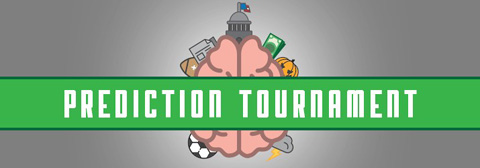
The OHIO Prediction Tournament is growing, adding a new one-credit course this fall to introduce new players to the tournament and to the art and science of prediction.
CAS 2406: Predictions and Forecasting: Applications to the Ohio University Prediction Tournament (1 credit) is open to Ohio University students, with no prior disciplinary knowledge needed. The course helps students become better predictors.
The College of Arts & Sciences continues to offer CAS 2405: Knowing What We Know, a 4-credit course that meets the General Education Tier 2 Applied Science and Mathematics requirement.
CAS 2406: Predictions and Forecasting—Applications to the Ohio University Prediction Tournament
- Learn basic methodologies and practices for good forecasting across many different disciplines.
- Apply those skills to making predictions in the Ohio University Prediction Tournament, in fields such as politics, economics, sport, meteorology, local events, etc.
The class does not assume any prior disciplinary knowledge.
This class is designed to complement the OHIO Prediction Tournament. All students enrolled for the course also must sign up for the Prediction Tournament (which is free).
Students will learn and discuss methodologies for making accurate predictions. They will apply their knowledge to predictions in the tournament, thereby providing real-time evaluation of their ability and growth as predictors. Assessment will include ensuring that students comment on their predictions, and on those of others, to provide rationales for choices and “wisdom of the crowds” style improvement over individual predictions.
“This course serves general education goals of improving students’ critical thinking skills,” says Dr. Daniel Phillips, Professor of Physics & Astronomy and one of three instructors. “As argued in Dr. Philip Tetlock’s Superforecasting (2015), based on his U.S.-government funded research on crowd-sourced forecasting, the course explores the possibility of developing general strategies and best practices for forecasting – practices that can be applied across contexts as diverse as politics, science, economics, and popular culture. Tetlock argues that certain intellectual traits or skills are found in people who are consistently good at forecasting; they are curious to seek out new data and have the ability to integrate that data into an applicable framework. Also important are the difficult tasks of perpetual self-reflection and acknowledgment of one’s biases and knowledge limitations. Such intellectual humility means that good forecasters are willing to modify their opinions or beliefs in the light of new information. This set of good-forecaster qualities mimics many descriptions of ‘critical thinking.'”
What is the OHIO Prediction Tournament?
The College of Arts & Sciences is sponsoring the “OHIO Prediction Tournament” along with accompanying activities to help students make better predictions. Watch for it in Fall 2017. For more information on the Prediction Tournament, contact Dr. Daniel Karney and Dr. Glenn Dutcher, both assistant professors of Economics. They are also co-teaching the CAS 2406 course.
The OHIO Prediction Tournament is aimed toward students of all majors with predictions made on a wide range of topics including politics, economics, popular entertainment, and many more. Questions will be generated by Ohio University faculty and released weekly throughout the tournament.
The tournament is user-friendly and encourages students to apply the analytical skills they learn within their major to problems outside of their own discipline. Tournament scoring is based on both accuracy and confidence. The OHIO Prediction Tournament has a total prize-money pool of more than $750 to be distributed across weekly and overall winners.
CAS 2405 Knowing What We Know (2AS)
This course will be offered in Spring 2018.
How often has someone asked you “How do you know that?” How do you tell fact from opinion? Do numbers never lie? What’s the difference between knowing and believing? Between uncertainty and skepticism? How can we figure out what happened long ago? Can we predict the future? Knowing What We Know is an interdisciplinary First Year Seminar taught by Ohio University faculty members from a variety of disciplines in the natural and social sciences and humanities. All are interested in the advantages and limitations of different means for understanding our society, our world, and the cosmos. Beginning with the historic branch of philosophy devoted to the analysis of knowledge, evidence, and similar notions, known as epistemology, instructors will introduce students to the way different forms of mathematical, statistical, and scientific reasoning enable us to grapple with problems ranging from the everyday (Should I bring an umbrella?) to the cosmic (How did the universe begin?). Exposure to different sorts of quantitative and qualitative reasoning will help equip students to better evaluate arguments and assertions on their merits. In the process, the course aspires to show students how knowledge is pursued on the cutting edge of contemporary research.



















Comments